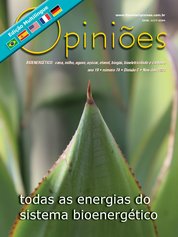Guilherme Linares Nolasco
Presidente executivo da UNEM - União Nacional do Etanol de Milho
OpAA74
Etanol de milho: parte da solução da transição energética
O avanço do desenvolvimento econômico e social projetado para as próximas décadas, motivado pelo crescimento populacional e a inclusão de classes sociais menos favorecidas ao ambiente de consumo, nos submete a uma reflexão em torno dos desafios e das responsabilidades da agenda global de transição energética, descarbonização e aumento da produção e oferta de alimentos ao redor do mundo.
O Brasil tem vocação para dar uma resposta rápida à demanda mundial por bioenergia e produção de alimentos sustentável. O País é detentor de características únicas de uma agricultura tropical, com disponibilidade de solos férteis, recursos hídricos e tecnologia adaptada aos seus diversos biomas, capazes de produzir duas a três culturas, em condição normal, num mesmo ano safra, podendo chegar a quatro cultivos com a incorporação da irrigação.
Com isso, tem capacidade de multiplicar sua produção agrícola sem ter que avançar sobre novas áreas de exploração.Segundo a Conab, o Brasil vai produzir mais de 125 milhões de toneladas de milho na safra 2022/23, em uma área de aproximadamente 22 milhões de hectares, ou seja, algo em torno de 95 sacas de milho por hectare. Mas tem gente colhendo “180 sacas”.
Ao mesmo tempo, em Mato Grosso, apenas 55% da área total cultivada de soja (11,5 milhões de hectares) recebe o milho de segunda safra (6,4 milhões de hectares). Paralelo a isso, o estado ainda tem mais de 10 milhões de pastagens com aptidão agrícola e grande potencial de intensificação da produção por meio da Integração Lavoura + Pecuária + Floresta (iLPF), proporcionando um círculo virtuoso de aumento da produção agrícola de alimentos, fibras, carnes e biocombustíveis, mais uma vez sem a necessidade de avançar sobre áreas ainda intactas.
Como há muitos anos diz o eterno Ministro Alysson Paulinelli, o milho será a grande cultura do Brasil, previsão antiga e já confirmada nessa última safra, saindo da condição de “safrinha” para uma produção maior que a safra de soja em Mato Grosso. Precisamos nos apropriar das nossas externalidades e transformar o potencial do crescimento da produção agrícola sustentável brasileira em ativo de moeda verde para atração de investimentos que busquem setores ESG, com contribuição para a descarbonização do planeta e estímulo ao aumento da produção de alimentos.
Nossas inesgotáveis fontes de energia renovável, como o etanol, o biodiesel, o bioagás, a energia fotovoltaica, hidroelétrica, eólica e a produção de alimentos de forma sustentável, são ativos vocacionados da atividade econômica nacional com carência de definição, reconhecimento e incentivo através de políticas públicas consistentes, que tornem nossos produtos sustentáveis reconhecidos e valorizados nos mercados nacionais e internacionais, por meio de pagamentos por serviços ambientais e remuneração na economia de baixo carbono.
O setor de etanol de milho é um case de sucesso nessa vertente de economia verde com modelo de governança ESG. Nos últimos cinco anos, atraído pela garantia de oferta abundante do milho de segunda safra no Centro-Oeste, o setor sustentou vultosos investimentos, amparado na dependência da rotação de cultura da soja, favorecendo a oferta e o suprimento do milho de segunda safra, independente das condições do mercado.
De nicho de mercado em 2015, saímos de uma produção ínfima para a capacidade atual instalada de mais 5 bilhões de litros de etanol (anidro + hidratado) nesta safra, incorporamos tecnologia que, atualmente, transforma uma tonelada de milho em mais de 430 litros de etanol em um ciclo de desfrute de mais de 90% da capacidade instalada, operando 350 dias ininterruptos a cada ciclo anual, com uma manutenção programada de 15 dias.
Em períodos de mudanças de governo, instabilidade econômica e política, o setor segue sustentado nas premissas das grandes agendas globais de transição energética, descarbonização e produção de alimentos como pilares mais robustos do crescimento da economia verde como estratégia e vocação de negócios para o Brasil.




